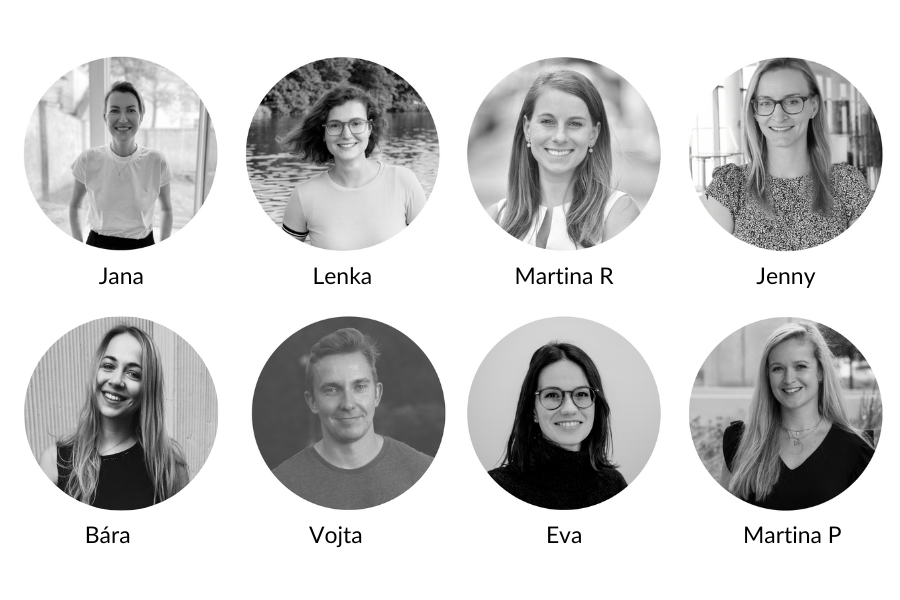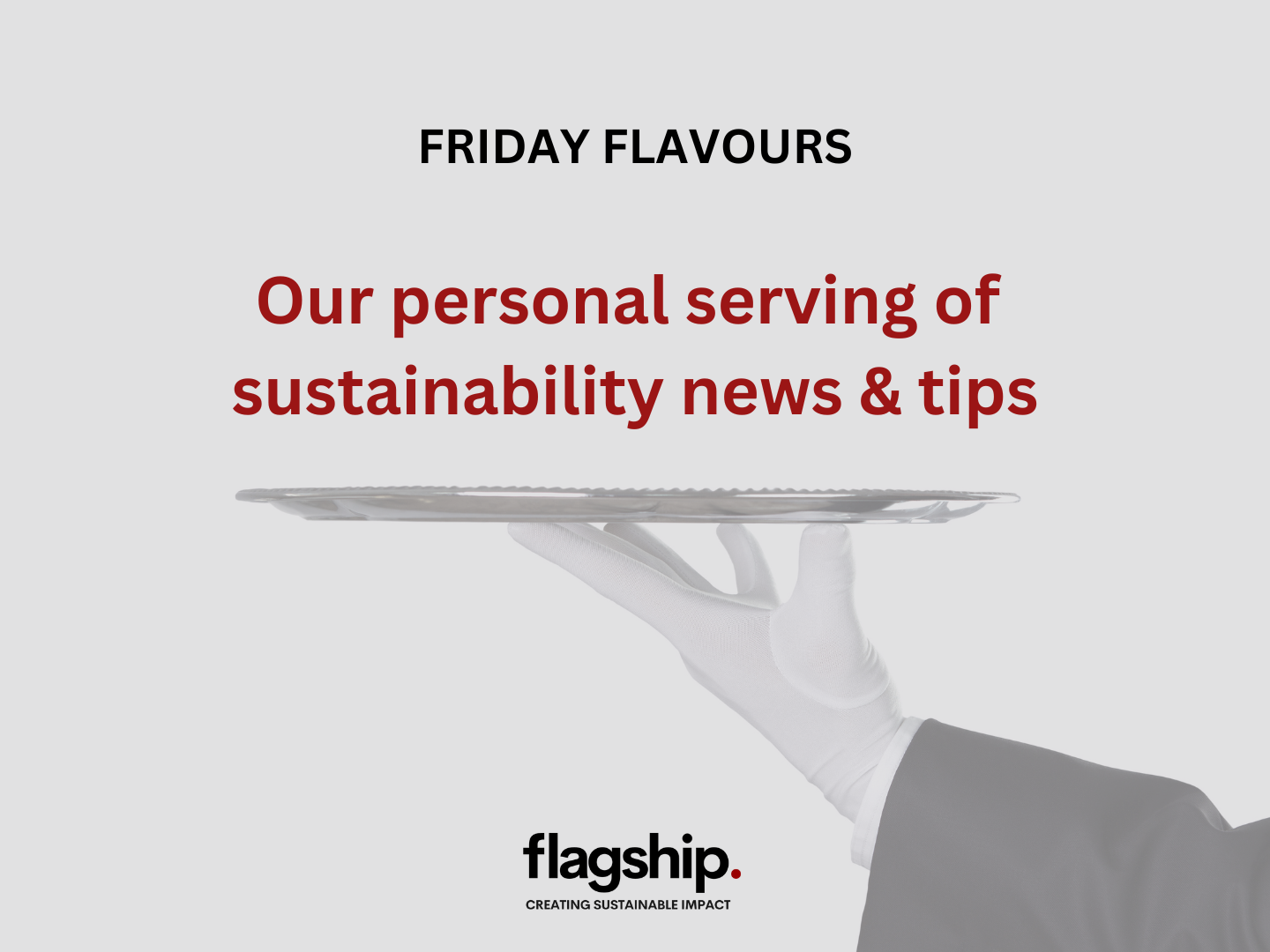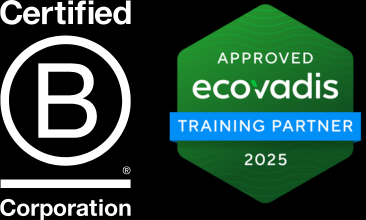The experts on our team regularly bring you a selection of recommendations and insights related to environmental and social responsibility. Whether it's an enticing book, an intriguing article, a project supporting a great cause or a helpful tool, we'll share our thoughts on why this particular piece spoke to us and why we think this particular topic is important.
Let us know what you think about our recommendations and insights, or whether you’d like to share some of your own tips with us - we’d love to hear from you.
"Carlos Terol's LinkedIn pageis a treasure trove of insightful commentary and practical resources for anyone committed to meaningful change in the environment and social impact sectors. From apps that will help you save the planet (I've been using Happy Cow for years now) to courses you can take to become a changemaker, his content spans a wide range of tools and educational materials designed to empower and inform. For those of you looking for more inspirational thought leaders to follow, check out the Top 20 changemakers to watch. I also have to mention Claudia Goldin, the third woman to win the Nobel Prize in economics. Through her extensive research she revealed that the wage gap closure has been inconsistent, tied to historical shifts in social norms and women's career and home role expectations and that it primarily stems from the impact of motherhood on women's careers."
"I've been slogging my way through Vaclav Smil's How the World Really Works. For anyone who doesn't know, Smil is a Czech-born energy expert and scientist who now is a professor emeritus in Canada and has become a global voice on the energy transition. He is famously (and controversially) critical of net-zero-by-2050 strategies and thinks they are unrealistic and implausible. As he writes, while fossil fuels provided 86% of our energy in the year 2000, today it is still 83% -- a minor reduction in 20 years, despite all efforts. His book is a dense read and I'm only in the beginning chapters, but it's a great deep drive into how much fossil fuels are integrated into absolutely every part of modern life, especially what he calls the "Four Pillars of Modern Civilization" -- concrete, steel, ammonia and plastic -- which account for 25% of greenhouse gas emissions. Ridding ourselves of our fossil fuel dependence will be a long and extremely difficult task, he writes, but we can focus our efforts now on many small -- and comparatively easy -- steps that will have huge gains, such as better insulating buildings, abandoning SUVs and switching from coal-fired electricity to natural gas. I recommend Smil's article providing a good overview of his ideas"
"Sustainability is to be blamed for corporate failures. This year has seen major layoffs at large US technology firms (e.g. Amazon and Salesforce), which have collectively let go over 200,000 workers, with Danone CEO Emmanuel Faber being ousted from his role in 2021. The media has been quick to conclude that the failure of these firms (or their management) is a result of their over-focus on sustainability at the expense of profits. In this article, Andrew Winston points out that companies fail routinely and that a range of factors are responsible for their performance and in most cases it is difficult to pin point blame on any one strategic activity. In fact, it's time to stop seeing sustainability as something so special, and embrace sustainability-related activities as a regular part of running a business in addition to HR, marketing, R&D or safety measures. Companies grow and fail through performance in a number of different areas. Sustainability is just another area that can both lift a business or hurt it if poorly handled. I would add that companies in Europe are now facing an increase in sustainability obligations, however, mapping the sustainability impact of businesses is an essential task necessary for survival. How could a company that doesn't commit to HR or invest in R&D succeed? How will a company that is unaware of how it is harming the environment or human rights function? Sustainability will soon be the norm and ignorance will no longer be an excuse."
"Recently, I've taken part in a public workshop - Climate Fresk. It is an interactive tool with the aim of explaining the origins of climate change. Everyone has probaly heard of green house gas emissions and that they are bad for the environment, nevertheless, there are many more factors at play. Although I wouldn't call it a game, as some people describe it, I think it is an insightful gateway for those who feel lost in the topic. The facts in Climate Fresk are sourced from the IPCC reports and so the 3-hours workshop strictly sticks to scientific findings. Personally, I would appreciate more room for talking about climate solutions and who the key players are in solving this issue. Companies which use Climate Fresk as a part of their sustainability training should not, therefore, think that this one-time activity is sufficient for employee education. Understanding the causes and effects of human activity on the climate must be combined with further discussions involving interdisciplinarity in coming up with necessary climate solutions in order to create real mindset shift."
"In September, the European Commission approved the revision of the National Recovery Plan. This is undoubtedly great news, as this financial instrument is an important tool for the Czech Republic's energy transition. The plan provides, for example, for investments in energy savings and the use of renewable energy sources in public buildings, households and businesses. Companies can also apply for financial support."
"I have recently started exploring the topic of circular clothing and the circularity of textile. It has begun with the discovery of a Czech startup Nilmore, the first circular clothing brand in the world, which has introduced a textile material with the lowest environmental impact yet. At the same time, it is spreading awareness of possible future recycling taxes or legal obligations that will force textile producers to take care of recycling (as it is already the case with electrical appliances).
Within the pilot project No neke store, I was particularly interested in the study How Czechs feel about buying and selling second-hand items. You will learn that 200,000 tonnes of textile waste are sent to landfill and incinerators in the Czech Republic, but also that 63% of people buy second hand to avoid waste and excess production. However, almost 1/3 of Czechs are also motivated by the ecological aspect. The issue of ecology, avoiding waste and throwing things away is mostly addressed by consumers in the 19-24 age group.
Thanks to these initiatives, perhaps more people will soon learn that producing new things all the time is unsustainable and that the current overproduction needs to be slowed down. Just remember how a few decades back we used to repair, replace, share and take better care of our stuff all the time."
"New standards and recommendations for monitoring and managing biodiversity in corporate strategy emerged this month. In addition to the Finance and Biodiversity Foundation publishing guidance on how to approach the differences and synergies between climate change and climate protection for financial institutions, a new standard from the Task Force on Climate-Related Financial Disclosures (TCFD) called TNFD (The Taskforce on Nature-related Financial Disclosures) was also published, giving companies a framework on how to report their corporate dependence and risks related to nature. These reports offer the first more conceptualised methodologies on how to approach this complex and still relatively abstract topic for companies. More concrete tools then include SCIRO's "natural capital accounting" tool. However, the practical use of these tools requires a certain degree of internal expertise within companies and an initial screening of their dependence on natural resources, a topic that is still very new to businesses. This is illustrated, for example, by a newly released survey from Capgemini, which found in a survey of more than 1,800 executives in 12 countries that only 24% of companies had actually analysed biodiversity risks and included them in their strategies."
"During maternity and parental leave, only 45% of women of those who wish to work, are actually able to (women make up 98% of primary caregivers of young children in the Czech Republic). The remaining majority is not allowed to do so. This is the result of a recent report by the MUMDOO platform and Deloitte on work flexibility, based on data from more than 1,100 respondents. They want to participate in the labour market primarily for their own psychological well-being, a sense of self-fulfilment and then finances. Personally, I can confirm that it is extremely refreshing to return to my old self for at least a few hours a week and not to worry about dropping out of my professional life for several years. What makes it difficult for women to return to work? First and foremost, it's the low supply of part-time and flexible jobs, coupled with the low availability of childcare options. The resulting situation benefits no-one - companies, constantly looking for labour, lose human capital and the state loses out on significant economic potential. Not to mention the gender pay gap. The report offers possible solutions and recommendations for women, companies and public administrations."



